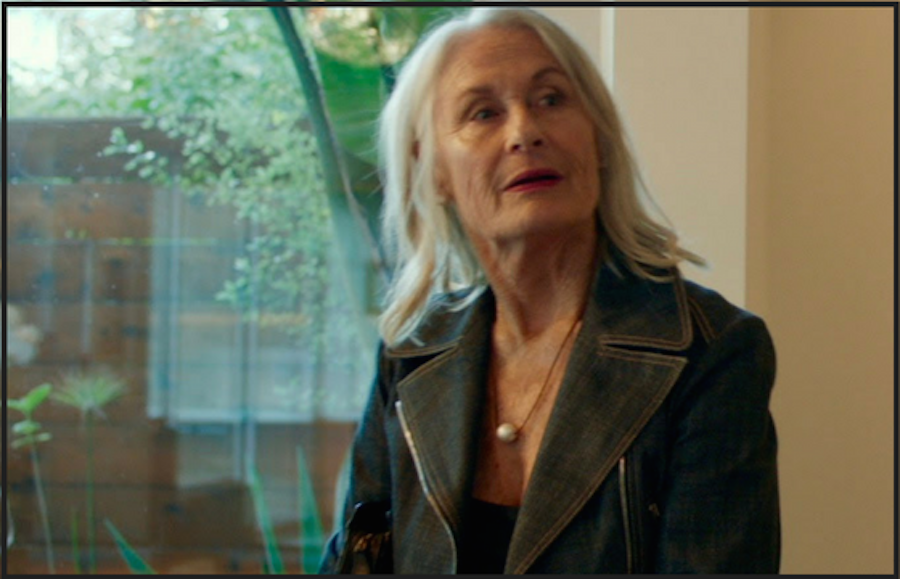Susan Bay Nimoy Disrupts Ageism With Grief, Passion and Renewal in Her Film, ‘Eve’

At 75, Susan Bay Nimoy is no slacker. As a former single working mother, a grandmother and philanthropist, she could have coasted. Instead, she made Eve, an exquisite short film about a raw, beautiful, sexy, woman-of-age, a poster image for an older, appealing and complex female character. “Eve’ exposes a 74-year-old woman’s journey through grief, sexual passion and renewal.
The movie was made with no expectation of success. “No one guarantees that it’ll be easy or that you’ll sell the movie,” Susan told me recently over mint tea in her serene art-filled home in Los Angeles. “But there’s within us, dreams and aspirations.”
The movie, which received rapturous praise at Sundance, emerged from Susan’s grief after the death of her husband, Leonard Nimoy, the acclaimed actor popularly known as Star Trek’s Mr. Spock. To get back on her feet, she returned to writing.
“I was filled with gratitude,” she said in describing the celebration at Sundance. “But I was always mindful that I gave birth to it in the face of Leonard’s death.”
“Leonard died almost three years ago to the week,” Susan said. Despite all her preparation, reading on grief, her sophisticated circle of friends and colleagues, she was devastated. She began writing letters to her husband. “The Dear Leonard letters were my way of continuing our thirty-year conversation,” she said.
As Susan’s writing routine strengthened, she used a small desk at Bad Robot’s offices, thanks to friend J.J. Abrams. After a few months, her creative chops kicked in and Eve took shape in Susan’s screenplay as the fictitious widow of a certain age with her own story of death and revitalization.
Serendipity shined on the development process. Susan corralled helpful critics among her writer friends, and key crew members were friends of friends. Nonetheless, all films are a miracle of planning and the right pieces falling into place. A few days before the shoot was to start, the whole thing nearly derailed. The actress playing Eve pulled out when she realized she’d need to show her breasts.
Faced with canceling production and encouraged by her crew, Susan took on the role herself. “I showed everything.” On-screen Susan’s natural grace and empathy are beautiful and arresting.
Eve attests to how rare it is to see older women portrayed honestly. “I take objection to our culture expecting us to fade from view,” Susan said. “I want to see more stories of women of age. And more women telling those stories.” It’s a battle she has been waging for a long time.
Over forty years ago, in the 1970s, Susan was one of the Original Six women in the DGA (Director’s Guild of America) to seek laws for gender parity in hiring and salary. Unfortunately, their efforts were stymied because using top-down hiring rules conflicts with a director’s contracted power. “It’s true that the director picks his or her crew,” Susan explained. “But if women aren’t part of the landscape, why would a male director pick a female DP (Director of Photography) or lens puller if he hasn’t ever worked with them?”
Today she sees a tipping point. “All these people out there have been building and building platforms for women’s voices. Finally, it took this question of sexual harassment to coalesce an entire community. I think there’s momentum.”
This year shows progress on several fronts. Thirty-eight percent of films at Sundance across all categories were by women. “I’ll be happier when it’s 50/50,” Susan commented.
“We have to be the change we want to see. We have to write the stories,” she stated. “Women internalize what the culture is saying if they don’t see themselves. It’s as if there’s something wrong with them. Why are men hunky with graying hair and lines on their faces?”
Susan is herself proof of graceful aging as evidenced by her photo in the “LA Times” accompanying Kenneth Turan’s glowing review of Eve on the front of the Calendar Section on January 19th. Self-possessed and happy, she makes being 75 look enviable. The beauty formula for future ref: red lipstick and shoulder length white bob. Classic yet very now. “My fifteen minutes of fame,” she quipped.
The most profound responses to Eve came from women in their 20s and 30s. “Oh, that’s what 75 looks like,” they told her. “That’s not so scary.” Lena Dunham’s creative partner, Jenni Konner, told Susan that Eve was an eight-episode mini-series. “I can write a feature, so I’m writing that,” Susan commented. “I feel a sense of urgency.”
We talk about inspiration. Does she have Mavis Staples R&B song, “I’ll Take You There”, which plays during a turning point in the movie, on a loop in her car? Susan laughed then replied, “Leonard believed in the honor of work. ‘Just put your ass in the chair. Don’t talk about the work. Do the work. The rest is noise.’”
“Eve” can be seen at festivals this year, including the Beverly Hills Film Festival from April 4-8.
READ MORE STORIES THAT MOVE HUMANITY FORWARD
READ MORE STORIES THAT MOVE HUMANITY FORWARD
SIGN UP FOR MARIA’S SUNDAY PAPER


